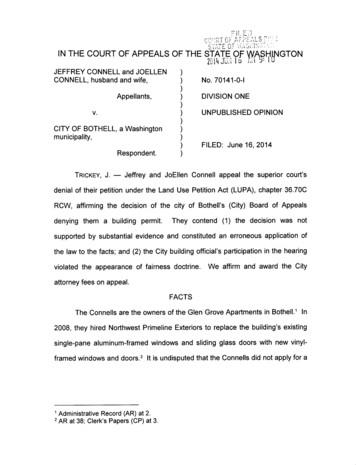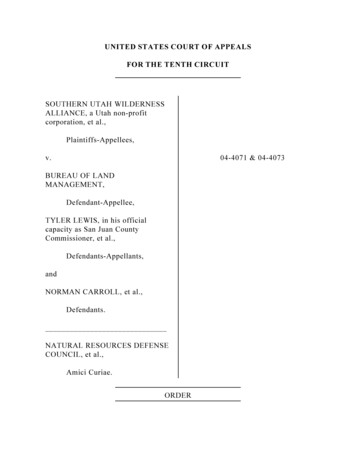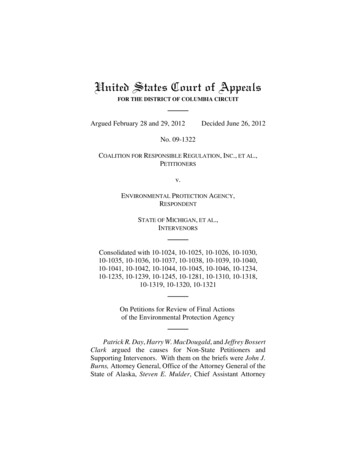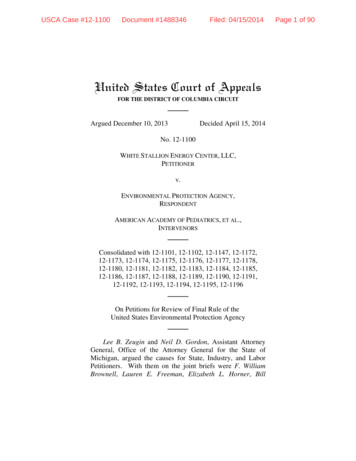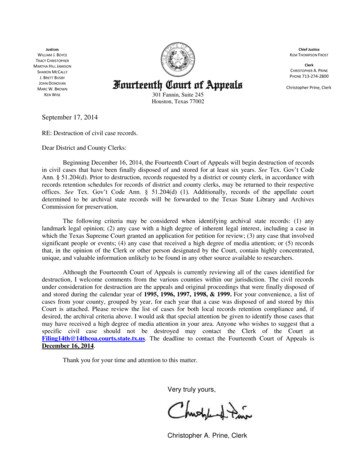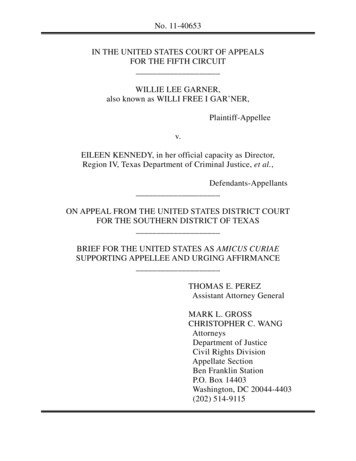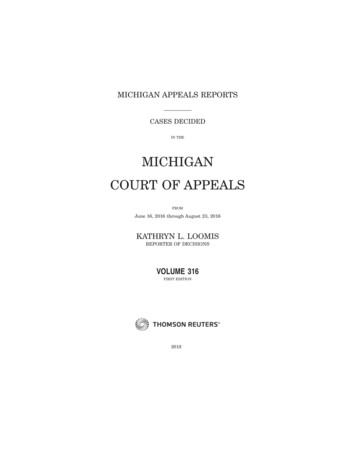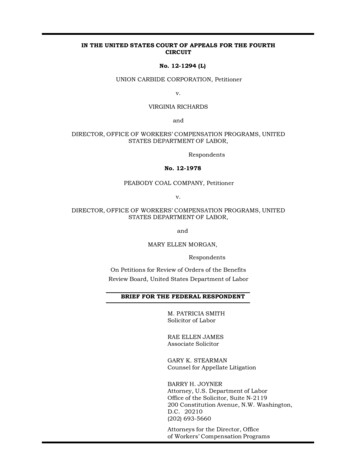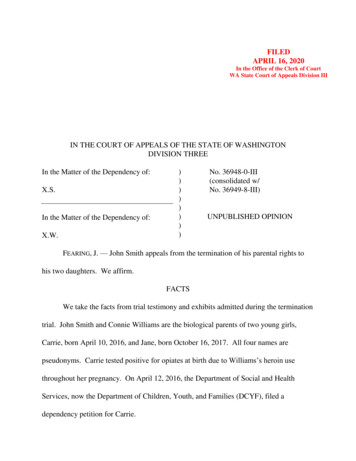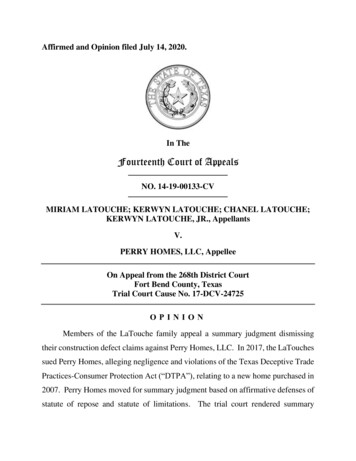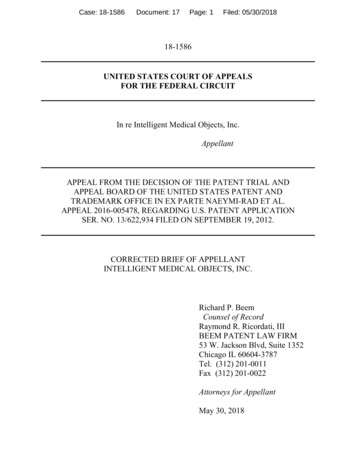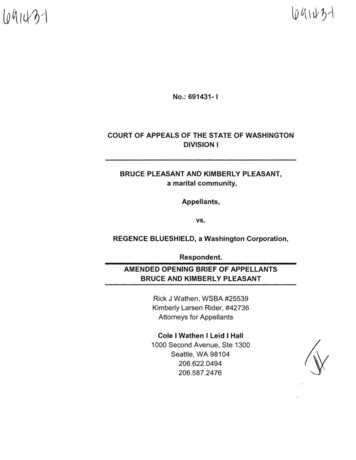
Transcription
Opinion issued July 16, 2020In TheCourt of AppealsFor TheFirst District of Texas————————————NO. IS EDWARD STARR, AppellantV.THE STATE OF TEXAS, AppelleeOn Appeal from the 179th District CourtHarris County, TexasTrial Court Case No. 1499661MEMORANDUM OPINIONAppellant, Karis Edward Starr, was charged with felon in possession of afirearm.1 Appellant pleaded guilty. The trial court deferred a finding of guilt andplaced appellant on community supervision for five years. Several months later, the1TEX. PENAL CODE § 46.04.
State of Texas filed a motion to adjudicate guilt, alleging that appellant had violatedmultiple conditions of his community supervision. After a hearing, the trial courtadjudicated appellant guilty and sentenced him to 35 years’ confinement. In a singleissue, appellant contends that his trial counsel provided ineffective assistance.We affirm.BackgroundOn February 20, 2016, appellant was charged with felon in possession of afirearm. Appellant had two previous convictions for felony possession of acontrolled substance. Appellant entered a plea of guilty, but the trial court deferreda finding of guilt and placed appellant on community supervision for five years.Included in the conditions of community supervision were, among other things, therequirements that appellant refrain from committing additional offenses andpossessing or consuming illegal drugs.On July 31, 2017, the State filed a motion to adjudicate appellant’s guilt. TheState alleged in the motion that appellant had committed numerous violations of theterms and conditions of his community supervision, including a new arrest forburglary of a building and testing positive on three occasions for marijuana orcocaine or both.Several months before its motion to adjudicate guilt was heard, the State filed,and the trial court granted, a motion for psychiatric examination for competency due2
to defense counsel’s claims of “family history of mental illness and . . . concernsabout [appellant]’s competency.” Barbra Martinez, a licensed psychologist with theHarris Center for Mental Health and IDD2, evaluated appellant’s competency tostand trial. In her report, Dr. Martinez noted that appellant stated he had receivedpsychiatric treatment as a child but not as an adult. Dr. Martinez also noted thatmedical records from the county jail indicated appellant had not sought or receivedmental health services during his current or previous detention periods and appellantdenied mental health concerns during his most recent intake health assessment. Dr.Martinez found that appellant did not “exhibit significant pathology to warrant amental health diagnosis.” Finally, Dr. Martinez opined that appellant “possesse[d]sufficient present ability to consult with the defense attorney with a reasonabledegree of rational understanding, and he possesse[d] a rational as well as factualunderstanding of the proceedings against him” and, therefore, was competent tostand trial.The State’s motion to adjudicate guilt was scheduled for October 9, 2018.That morning, before hearing the motion to adjudicate guilt, the court held an Akehearing. See Ake v. Oklahoma, 470 U.S. 68, 74 (1985) (holding that “when adefendant has made a preliminary showing that his sanity at the time of the offenseis likely to be a significant factor at trial, the Constitution requires that a State2Intellectual and Developmental Disabilities3
provide access to a psychiatrist’s assistance on this issue if the defendant cannototherwise afford one”). At that hearing, defense counsel testified that he hadpreviously approached the judge on an Ake motion on January 8, 2018, after he“realize[d] that [his] client had a mental issue.” Counsel testified that the trial courtauthorized the expenditure of 2500 for a mental health expert. Counsel furthertestified that he spoke with no fewer than six psychologists about evaluatingappellant but none would perform the evaluation for less than 3250, which was 750 more than the trial court had authorized. Counsel acknowledged that it hadbeen “a long time” (10 months) since he received the 2500 and admitted this wasnot the first setting but explained that he had suffered a family emergency and hasthree children. Counsel requested that the trial court award an additional 750 andgrant a one-week continuance of the motion-to-adjudicate hearing to allow himadditional time to secure a mental health evaluation of appellant. After noting thatcounsel had not asked for the additional funds before the day of the motion-toadjudicate hearing, the trial court denied the motion.Although the facts related to the January 2018 Ake motion are not disputed bythe parties, the appellate record does not include any transcript from that Ake hearing(if a hearing was held), a written Ake motion filed by appellant, or a written orderfrom the trial court on said motion.4
Immediately after the October Ake hearing, the trial court heard the State’smotion to adjudicate guilt. The State presented the testimony of four witnesses:(1) Dedria Hunter, the probation officer in the 179th District Court; (2) ChestonOliver, a community supervision technician; (3) Steve Harris, the director of OneSource Technology, a forensic toxicology lab; and (4) Irving Lira, a police officerwith the Houston Police Department. Hunter testified that appellant had violated theterms and conditions of his community supervision by committing additionalviolations of the law and by failing various drug tests, among other things. Hunteralso testified that appellant’s probation officer, Jonathan Nunn, was no longeremployed with the Harris County Community Supervision and CorrectionDepartment. Oliver provided testimony related to the collection of urine samplesfrom appellant for his court-ordered drug testing, and Harris testified that appellant’ssamples tested positive for marijuana or cocaine on three separate occasions. Finally,Officer Lira testified about the circumstances surrounding appellant’s arrest forburglary, and the State presented a video showing appellant and two othersattempting to steal an ATM machine.At the conclusion of the State’s evidence, appellant’s counsel, relying on theState’s subpoena, attempted to call appellant’s probation officer, Jonathan Nunn.However, Nunn was not present at the courthouse. Appellant’s counsel objected tomoving forward with the remainder of the hearing, arguing that Nunn was a material5
witness and that the defense’s inability to cross-examine him violated theConfrontation Clause. The trial court overruled the objection, and the defense rested.After closing statements, the trial court adjudicated appellant guilty and sentencedhim to 35 years’ confinement.Ineffective AssistanceIn one issue, appellant argues that his counsel rendered ineffective assistanceby failing to: (1) timely request additional funds to hire a mental health expert; (2)present the testimony of a mental health expert at the hearing on the State’s motionto adjudicate guilt; (3) secure the testimony of a critical witness; and (4) object tohis 35-year sentence as cruel and unusual punishment. We address each of thesearguments in turn.A.Applicable law and standard of reviewThe United States Constitution and the Texas Constitution guarantee anaccused the right to assistance of counsel. U.S. CONST. amend. VI; TEX. CONST. art.I, § 10. This right necessarily includes the right to reasonably effective assistance ofcounsel. Strickland v. Washington, 466 U.S. 668, 686 (1984); Garcia v. State, 57S.W.3d 436, 440 (Tex. Crim. App. 2001). To prevail on a claim of ineffectiveassistance of counsel, an appellant must prove that (1) his counsel’s performance fellbelow an objective standard of reasonableness and (2) there is a reasonable6
probability that, but for counsel’s deficiency, the result of the proceeding would havebeen different. Strickland, 466 U.S. at 687.In reviewing counsel’s performance under Strickland’s first prong, we look tothe totality of the representation to determine the effectiveness of counsel, indulginga strong presumption that counsel’s performance fell within the wide range ofreasonable professional assistance and was motivated by sound trial strategy. 466U.S. at 689. To defeat this presumption, any allegation of ineffectiveness must befirmly founded in the record so that the record affirmatively shows the allegedineffectiveness. Prine v. State, 537 S.W.3d 113, 117 (Tex. Crim. App. 2017).Generally, counsel should be given an opportunity to explain his actions beforebeing found ineffective. Id. In most cases, direct appeal is an inadequate vehicle forraising an ineffective assistance claim because the record is undeveloped and doesnot adequately reflect the motives behind counsel’s actions. See Rylander v. State,101 S.W.3d 107, 110–11 (Tex. Crim. App. 2003). In the face of a silent record, wecannot know trial counsel’s strategy, so we will not find deficient performanceunless the challenged conduct was “so outrageous that no competent attorney wouldhave engaged in it.” Goodspeed v. State, 187 S.W.3d 390, 392 (Tex. Crim. App.2005).Under Strickland’s second prong, in reviewing whether there is a reasonableprobability that, but for counsel’s deficiency, the result of the proceeding would have7
been different, a “reasonable probability is a probability sufficient to undermineconfidence in the outcome.” 466 U.S. at 694. With respect to claims of ineffectiveassistance during the punishment phase, the appellant must show a reasonableprobability that the assessment of punishment would have been less severe in theabsence of counsel’s deficient performance. Bazan v. State, 403 S.W.3d 8, 13 (Tex.App.—Houston [1st Dist.] 2012, pet. ref’d). It is not enough to show that counsel’serrors had some conceivable effect on the outcome of the punishment assessed;rather, the likelihood of a different result must be “substantial.” Id.The appellant has the burden to establish both prongs by a preponderance ofthe evidence. Jackson v. State, 973 S.W.2d 954, 956 (Tex. Crim. App. 1998). Theappellant’s “failure to satisfy one prong of the Strickland test negates a court’s needto consider the other prong.” Williams v. State, 301 S.W.3d 675, 687 (Tex. Crim.App. 2009); see also Strickland, 466 U.S. at 697.B.Failure to timely request additional funds for mental health expertAppellant first argues that his counsel was ineffective because counsel failedto timely request additional funds necessary to hire a mental health expert before thehearing on the motion to adjudicate guilt. Specifically, appellant asserts thatcounsel’s failure to request additional funds until the morning of the hearing on themotion to adjudicate guilt amounted to no request at all. In response, the Statecontends that the record is silent as to counsel’s strategy for waiting to request funds.8
The State argues that although counsel testified to a family emergency, he “neveractually articulate[d] why he waited to request additional funds.” Therefore, theState asserts, because counsel did not “directly” explain his strategy, appellant’sineffective-assistance claim is not firmly grounded in the record.We cannot agree with the State that the record is completely silent as tocounsel’s strategy. Unlike cases where the record contains no explanation in therecord for counsel’s actions (or inactions), appellant’s trial counsel did provide sometestimony, albeit limited, as to why he did not seek additional funds for a mentalhealth evaluation at an earlier date:Q.Now, this seems like a long time because it’s now October 9th?A.Yes.Q.And this is not the first setting?A.No.Q.So did you have a family emergency?A.Yes.Q.And I -- you have three children?A.I do.Q.Their ages?A.12, 9, and 7.Q.And their mommas work?9
A.Yes, their mommas work.Q.And you’ve been dealing with that as well?A.(Nodding head in the affirmative.).It is apparent from this exchange that counsel’s justification for failing to requestadditional funds sooner was due, at least in part, to a family emergency and childcareissues.However, we cannot say that the record affirmatively shows the allegedineffectiveness.3 Appellant’s ineffective-assistance claim centers around counsel’sfailure to timely request additional funds for a mental health expert under Ake. InAke, the United States Supreme Court held that due process may require that theState provide access to a psychiatrist’s assistance when an indigent defendant hasmade a “preliminary showing that his sanity at the time of the offense is likely to bea significant factor at trial.” 470 U.S. at 74. “Before an indigent defendant is entitledto appointment and payment by the State for expert assistance, he must make apretrial ‘preliminary showing’ that is based upon more ‘than undeveloped assertionsthat the requested assistance would be beneficial.’” Ex parte Jimenez, 364 S.W.3d3We note that appellant did not move for a new trial. When there is no properevidentiary hearing on a motion for new trial, it is difficult to show counsel’sperformance was so deficient as to overcome the presumption that counsel’sconduct was reasonable and professional. Morrison v. State, 132 S.W.3d 37, 47(Tex. App.—Houston [14th Dist.] 2004, pet. ref’d) (citing Bone v. State, 77 S.W.3d828, 833 (Tex. Crim. App. 2002)).10
866, 881 (Tex. Crim. App. 2012) (quoting Williams v. State, 958 S.W.2d 186, 192(Tex. Crim. App. 1997)). To make this showing, “the defendant necessarily has toexplain his theories and describe with some specificity how an expert would assisthim.” Williams, 958 S.W.2d at 193.The record does not show that appellant’s counsel erred by failing to timelyrequest additional funds for a mental health expert because there is no evidence thatappellant’s mental health would have been a significant factor at the hearing on themotion to adjudicate guilt. Although appellant claims that had “the Court [] heardconvincing expert testimony that the appellant was mentally ill . . . the Court mostlikely would have reinstated [his] probation, amended the conditions of probation,and placed [him] on the Mental Health caseload,” nothing in the record suggests thatappellant has a mental illness, other than statements by his counsel at theadjudication hearing that his client hears voices and “has documented illness goingback to elementary school.” In a case like this, where funds for a mental health experthave already been awarded, we would expect to see in the record a written Akemotion setting forth the reasons why appellant believed his mental illness would bea significant factor at trial, accompanied by affidavits or other evidence in supportof this theory, as well as a written order from the trial court granting such a request.See Jimenez, 364 S.W.3d at 881.11
But as noted above, the record on appeal does not contain a written Akemotion, a transcript for the January 2018 Ake hearing (if held and transcribed), or anorder granting appellant 2500 for a mental health expert. Although the fact that allthese things occurred is undisputed in the parties’ briefing, there is nothing in therecord related to that first Ake motion or hearing for this Court to review. Neitherdoes the record reflect what favorable evidence, if any, a psychiatric evaluationwould have shown nor how that evidence would have altered the trial court’sadjudication of guilt or resulted in a lesser sentence. Moreover, the trial court wasaware of Dr. Martinez’s report and conclusions that appellant had no mentaldisability. Even if appellant had obtained a favorable psychological evaluation fromanother expert, the trial court could have disbelieved appellant’s expert and believedDr. Martinez. See Canseco v. State, 199 S.W.3d 437, 439 (Tex. App.—Houston [1stDist.] 2006, pet. ref’d) (noting that trial court is exclusive judge of witnesscredibility).The record is also devoid of any medical records or other documentaryevidence of a mental illness or any proffered testimony from medical professionals,family members, or other witnesses who could speak to appellant’s mental illness,if any. Without evidence of this sort, we are left only with a record containingcounsel’s statements that his client suffered from a mental illness and Dr. Martinez’scontradictory report, which includes findings that appellant did not “exhibit12
significant pathology to warrant a mental health diagnosis,” had not been treated formental illness as an adult, and was competent to stand trial. Without evidence ofappellant’s sanity being a significant factor at trial, we cannot conclude that counselwas ineffective for failing to request additional funding for one before the day of thehearing. See, e.g., Maldonado v. State, No. 14-03-00074-CR, 2004 WL 234377, at*2 (Tex. App.—Houston [14th Dist.] Feb. 10, 2004, pet. ref’d) (mem. op., notdesignated for publication) (holding that counsel was not ineffective for failing torequest mental health expert because appellant had not demonstrated sanity waslikely to be significant factor at trial, neutral expert determined appellant wascompetent to stand trial, and record contained no evidence appellant had mentalillness).We further find the cases relied on by appellant to be distinguishable. InHinton v. Alabama, the United States Supreme Court held that the “trial attorney’sfailure to request additional funding in order to replace an expert he knew to beinadequate because he mistakenly believed that he had received all he could getunder Alabama law constituted deficient performance.” 571 U.S. 263, 274 (2014).However, the Court emphasized that the “only inadequate assistance of counsel herewas the inexcusable mistake of law—the unreasonable failure to understand theresources that state law made available to him—that caused counsel to employ an13
expert that he himself deemed inadequate.” Id. at 275 (emphasis in original). Thiscase does not involve a similar mistake of law.Appellant also cites two cases in support of his argument that failure to act ina timely manner equates to ineffective assistance of counsel. See Randle v. State,847 S.W.2d 576 (Tex. Crim. App. 1993); Ex parte Axel, 757 S.W.2d 369 (Tex. Crim.App. 1988). But neither case involved the attorney’s failure to request additionalfunds for an expert when the record was devoid of evidence establishing a need forsuch an expert. See Randle, 847 S.W.2d at 581 (holding that failure to informprosecutor of defendant’s acceptance of plea bargain in timely manner wasineffective assistance); Axel, 757 S.W.2d at 374–75 (holding that failure to filetimely notice of appeal was ineffective assistance).We recognize the possibility that the lack of evidence in the record may bedue to counsel’s omission. Where the error alleged against counsel is one ofomission rather than commission, however, the point is often better made through ahabeas corpus proceeding which would allow the defendant to introduce evidencecounsel may have neglected. See Jackson, 973 S.W.2d at 957 (observing thatappellant is not prohibited from raising ineffective assistance claim in habeas corpusproceeding when “direct appeal has not provided an adequate record”); see alsoCortez v. State, No. 04-98-00645-CR, 1999 WL 1021557, at *3 (Tex. App.—SanAntonio June 2, 1999, no pet.) (not designated for publication) (recognizing that lack14
of evidence in record on direct appeal could be due to counsel’s ineffectiveness butnevertheless holding record did not show counsel erred by failing to obtain approvalof funds for investigator).We overrule appellant’s first argument on ineffective assistance.C.Failure to present testimony of mental health expertAppellant also argues that his counsel was ineffective because counsel failedto present testimony of an expert psychiatrist that would refute the State’s case.Specifically, appellant asserts that although his counsel argued at the motion-toadjudicate hearing that appellant suffered from “mental issues, he failed to pr
medical records from the county jail indicated appellant had not sought or received . denied mental health concerns during his most recent intake health assessment. . a forensic toxicology lab; and (4) Irving Lira, a police officer with the Houston Police Department. Hunter testified th
